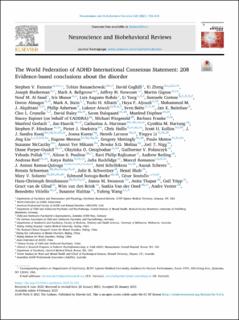The World Federation of ADHD International Consensus Statement: 208 Evidence-based conclusions about the disorder
Faraone, Stephen; Banaschewski, Tobias; Coghill, David; Zheng, Yi; Biederman, Joseph; Bellgrove, Mark A.; Newcorn, Jeffrey H.; Gignac, Martin; Al Saud, Nouf M.; Manor, Iris; Rohde, Luis Augusto; Yang, Li; Cortese, Samuele; Almagor, Doron; Stein, Mark A.; Albatti, Turki H.; Aljoudi, Haya F.; Alqahtani, Mohammed M.J.; Asherson, Philip; Atwoli, Lukoye; Bölte, Sven; Buitelaar, Jan K.; Crunelle, Cleo L.; Daley, David; Dalsgaard, Søren; Döpfner, Manfred; Espinet, Stacey; Fitzgerald, Michael; Franke, Barbara; Gerlach, Manfred; Haavik, Jan; Hartman, Catharina A.; Hartung, Cynthia M.; Hinshaw, Stephen P.; Hoekstra, Pieter J.; Hollis, Chris; Kollins, Scott H.; Sandra Kooij, Kooij; Kuntsi, Jonna; Larsson, Henrik; Li, Tingyu; Liu, Jing; Merzon, Eugene; Mattingly, Gregory; Mattos, Paulo; McCarthy, Suzanne; Mikami, Amori Yee; Molina, Brooke S.G.; Nigg, Joel T.; Purper-Ouakil, Diane; Omigbodun, Olayinka O.; Polanczyk, Guilherme V.; Pollak, Yehuda; Poulton, Alison S.; Rajkumar, Ravi Philip; Reding, Andrew; Reif, Andreas; Rubia, Katya; Rucklidge, Julia; Romanos, Marcel; Ramos-Quiroga, J. Antoni; Schellekens, Arnt; Scheres, Anouk; Schoeman, Renata; Schweitzer, Julie B.; Shah, Henal; Solanto, Mary V.; Sonuga-Barke, Edmund; Soutullo, César; Steinhausen, Hans-Christoph; Swanson, James M.; Thapar, Anita; Tripp, G; van de Glind, Geurt; Brink, Wim van den; Van der Oord, Saskia; Venter, Andre; Vitiello, Benedetto; Walitza, Susanne; Wang, Yufeng
Journal article, Peer reviewed
Published version

Åpne
Permanent lenke
https://hdl.handle.net/11250/2990263Utgivelsesdato
2021Metadata
Vis full innførselSamlinger
- Department of Biomedicine [710]
- Registrations from Cristin [9791]
Originalversjon
Neuroscience and Biobehavioral Reviews. 2021, 128, 789-818. 10.1016/j.neubiorev.2021.01.022Sammendrag
Background
Misconceptions about ADHD stigmatize affected people, reduce credibility of providers, and prevent/delay treatment. To challenge misconceptions, we curated findings with strong evidence base.
Methods
We reviewed studies with more than 2000 participants or meta-analyses from five or more studies or 2000 or more participants. We excluded meta-analyses that did not assess publication bias, except for meta-analyses of prevalence. For network meta-analyses we required comparison adjusted funnel plots. We excluded treatment studies with waiting-list or treatment as usual controls. From this literature, we extracted evidence-based assertions about the disorder.
Results
We generated 208 empirically supported statements about ADHD. The status of the included statements as empirically supported is approved by 80 authors from 27 countries and 6 continents. The contents of the manuscript are endorsed by 366 people who have read this document and agree with its contents.
Conclusions
Many findings in ADHD are supported by meta-analysis. These allow for firm statements about the nature, course, outcome causes, and treatments for disorders that are useful for reducing misconceptions and stigma.
